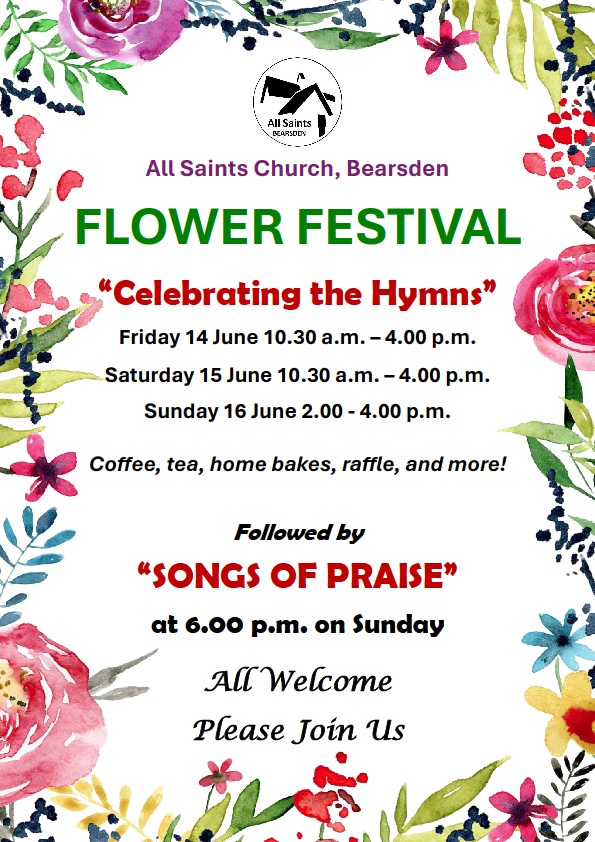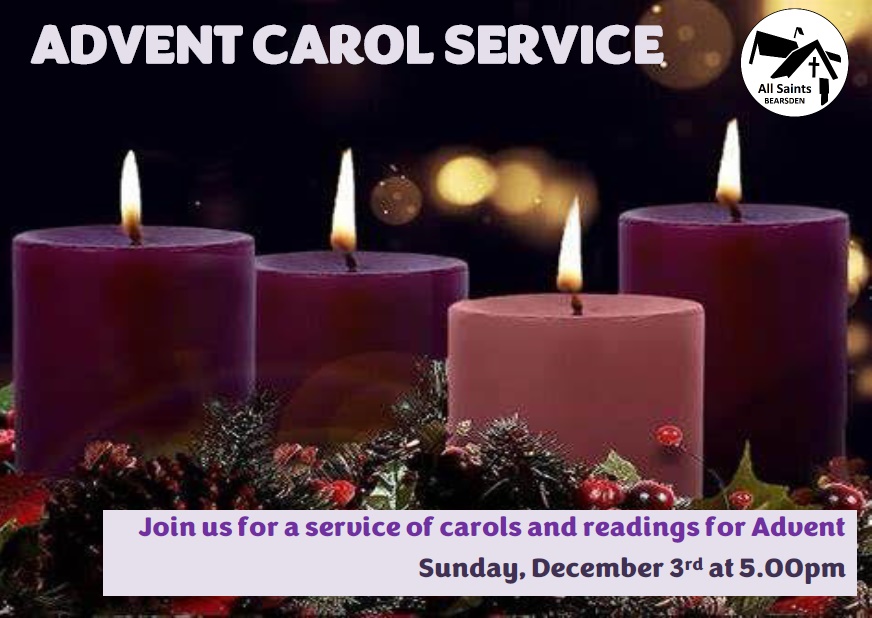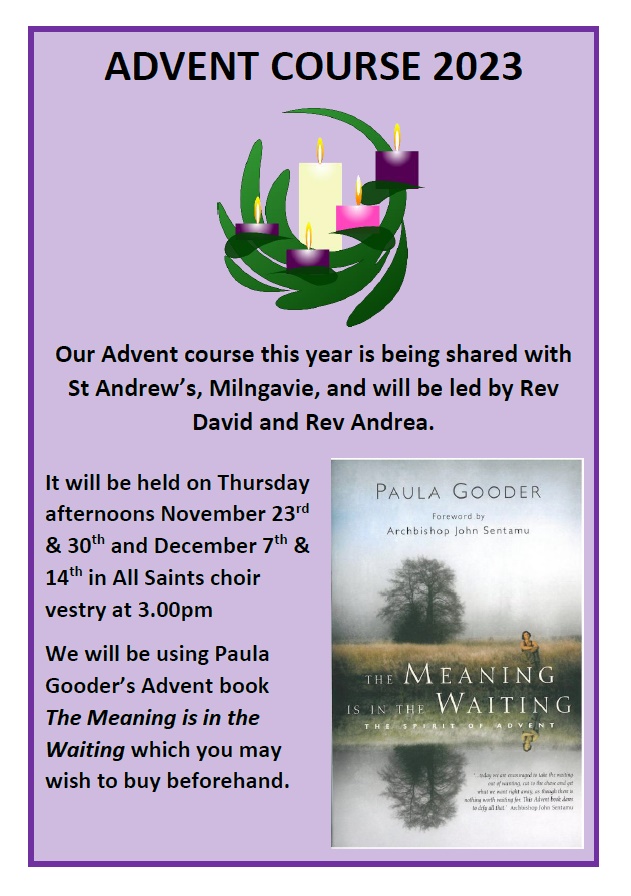 Flower Festival
Flower Festival
June 14th, 15th and 16th
The church will be open from 10.30am till 4.00pm on Friday and Saturday and from 2pm on Sunday until 4pm, followed by Songs of Praise at 6pm.
A reflective start to the Advent season will be provided at our Advent Carol Service on Sunday, December 3rd at 5.00pm.
We will be joined by St Andrew’s, Milngavie, for this Advent Sunday evening service, which includes readings to help us think about the season ahead, hymns and carols for all the congregation, and choir items to enhance the mood.
It is the perfect start to Advent and all are welcome.
J oin us for our Advent Course this year at All Saints – we are sharing in this with our friends at St Andrew’s, Milngavie.
oin us for our Advent Course this year at All Saints – we are sharing in this with our friends at St Andrew’s, Milngavie.
The course will be held on Thursday afternoons November 23rd and 30th and December 7th and 14th in All Saints church choir vestry at 3.00pm.
We are using Paula Gooder’s Advent book The Meaning is in the Waiting as the basis of our course.
Paula Gooder provides a profoundly biblical guide to the season of Advent and we explore its central theme of waiting in the company of the biblical characters who feature prominently in the lectionary readings for the season: Abraham and Sarah who waited for a child, Isaiah and the prophets who waited for judgement and redemption, John the Baptist whose role was to wait in the wilderness until the prophecies he foretold were realised, Mary whose waiting began in pregnancy and continued as she stood at the foot of the cross.
This offers an exquisite meditation on the spirituality of waiting – the active doing of nothing – as a way of enhancing our lives and bringing us closer to God.
The AGM of the church will be held on Sunday 29th October after the 10.30am service.
For details of the Bishop’s 2023 Lent Appeal and information on giving visit here
At All Saints, we have restarted coffee after the morning service.
The Wednesday Lunches are now able to welcome congregation and friends.
With our new organist, the choir will be starting again in March. Anyone interested will be very welcome.
“Listen to the quiet voices” – The Primus, Bishop Mark Strange, looks at the hopes and expectations around COP26 as we seek to care for God’s creation As I write this, I’m sitting watching the leaves changing colour outside my office window. There’s a tree which is just at the corner of the churchyard at Arpafeelie which always begins to turn first, its leaves slowly, then quickly, becoming golden before plunging to a striking mix of reds then browns. As I have watched the autumn begin, the plants begin to bed down for the winter in this changing of the season; I remember that once the bare winter is over then the cycle will come round again. We will have the cool, clear spring and then the joyful warmth of summer. So it has been for much of my life. Yet as we have stayed at home over these past months because of the pandemic, I have appreciated the slow but ever-moving changing of the seasons in a new way. But just as I can anticipate the leaves coming back on that tree, it is becoming clear that in other places around the world many others no longer know what their seasons will hold. People can’t be confident that the rains will come, or know if their land will flood. People can no longer be confident that their crops will grow, or know if they will have the time and energy to harvest. People and places are struggling and dying now because of the twin crises of climate change and biodiversity loss. People are increasingly anxious and increasingly fearful, and there is growing anger and concern for the future. In Scotland we have a stable climate. As is so often the case, the worst affects of climate crisis will be felt that much more strongly in places where their climate is not so stable. So the changes that I can see, and the emotions which flow through me as I know they flow through many in our Church, are much more pressing in other parts of our world.  I’ve been thinking about those emotions and reactions as we all prepare for COP26 in Glasgow. The hopes and expectations of so many people are that political leaders will listen to the voices of people around the world who are simply frightened for the very ground they stand on and the lives around them. The Scottish Episcopal Church has put in place and will continue to develop processes which enable us to have a much lighter footprint on the ground, and will enable us to make a better use of the resource we have so that we don’t contribute to stripping the environment of those things which produce the very air that we breathe. I’ve been thinking about those emotions and reactions as we all prepare for COP26 in Glasgow. The hopes and expectations of so many people are that political leaders will listen to the voices of people around the world who are simply frightened for the very ground they stand on and the lives around them. The Scottish Episcopal Church has put in place and will continue to develop processes which enable us to have a much lighter footprint on the ground, and will enable us to make a better use of the resource we have so that we don’t contribute to stripping the environment of those things which produce the very air that we breathe.There will be moments of tears, moments of anger, and moments of laughter in Glasgow, but I hope there will be moments of prayer. Why are we going? Why is our Anglican Communion delegation gathering? It is because as a church, and as people of faith, that’s what we do: we pray. Our prayers are to God who created this beautiful little planet we all live on. Our prayers are that God will help us to do everything in our power to protect the environment we live in. With prayer, with conversation and simply by being visibly present, we can use the time to push home the point to political leaders that this crisis is real and that people of the world, especially those with the least ability to affect change, are being impacted by our continual drive for greater consumption, greater profits, and greater power. We will try and insist that they listen to the quiet voices, voices that might not be physically present, and we will pray again that world leaders make the right decisions for our planet. The Scottish Episcopal Church will be there along with old friends and hopefully new friends. We will spend our time carefully encouraging, noisily supporting and – I suspect – sometimes loudly reacting to what is happening because to honour God means caring for God’s creation, not simply for what it gives us but so that we can pass it on, healing and restoring, to those who will come after us. Please pray for all who will gather in Glasgow, for the leaders of the nations and those of us who will bring hope and prayer. |